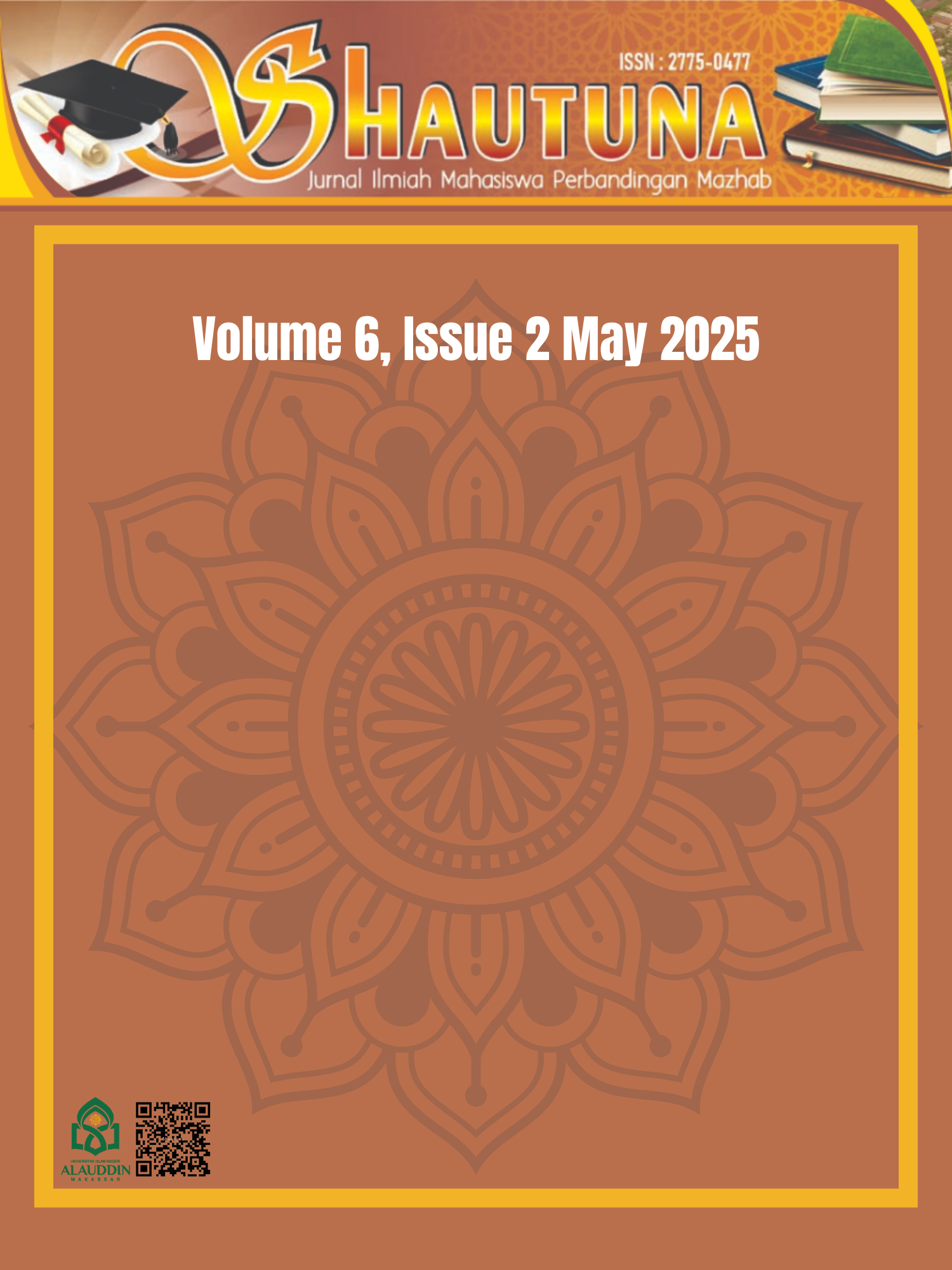Divorce Due to Domestic Violence in Religious Court of Kendari in the Perspective of Maqashid al-Syariah
Legal Policy Implications in Protecting Women and Children
DOI:
https://doi.org/10.24252/shautuna.v6i2.50736Keywords:
Divorce, Domestic Violence, Religious Courts, Maqashid SyariahAbstract
This research examined the phenomenon of divorce due to domestic violence (DV) handled at the Religious Court of Kendari Class 1A, focusing on the analysis of causal factors, the basis for legal considerations by judges, and the relevance of the maqashid al-syariah approach in resolving the cases. This study employed a qualitative approach with a case study method. The primary data were obtained from observation, interviews with judges and related parties, and analysis of case documents. Meanwhile, the secondary data were collected through a literature review of books, journals, and laws and regulations. The purpose of this research was to provide a comprehensive understanding of the legal dynamics of divorce due to domestic violence (DV) and to explore the role of Shari'a values in decision-making. The results indicated that in the past four years, 2,466 divorce cases have been decided by the Religious Court of Kendari, 190 of which involved DV. Factors contributing to domestic violence (DV) included economic pressure, infidelity, deviant behavior, and poor communication within the household. In deciding cases, judges referred to Law Number 1 of 1974 concerning Marriage, the Compilation of Islamic Law, Supreme Court instruments, and norms of fiqh and customary law. The maqashid al-shariah approach prioritized the principles of hifz al-nafs (protection of the soul) and hifz al-'ird (protection of honor), thus viewing divorce as an effort to save individuals from physical and psychological violence that could damage human dignity. This research demonstrates the importance of educating the public about the dangers of domestic violence, firm law enforcement against perpetrators, and preventive and rehabilitative programs for victims. The synergy between positive law and the values of maqashid al-shariah provides a strategic approach to realizing justice and well-being in resolving family disputes.
References
Amanda, Gilang Surya, and Muktarruddin Muktarruddin. “Dampak Perceraian Orang Tua Terhadap Perilaku Beragama Remaja Di Desa Klambir V Kebun Kabupaten Deli Serdang.” Kamaya: Jurnal Ilmu Agama 7, no. 2 (2024): 169–79. https://doi.org/10.37329/kamaya.v7i2.3191.
Ariesa, Tata Seli, Shofiatul Jannah, and Moh. Muslim. “Pernikahan Dini Dan Kegagalan Rumah Tangga (Analisis Kasus Perceraian Di Pengadilan Agama Kabupaten Malang).” Hikmatina: Jurnal Ilmiah Hukum Keluarga Islam 6, no. 2 (2024): 245–54. https://jim.unisma.ac.id/index.php/jh/article/view/25878.
Aziz, Abdul. “Batas Usia Perkawinan Dalam Undang-Undang Nomor 16 Tahun 2019: Analisis Psikologi Dan Maslahah Mursalah.” Tasyri’: Journal of Islamic Law 1, no. 1 (2022): 25–44. https://doi.org/10.53038/tsyr.v1i1.3.
Dahwadin, Dahwadin, Enceng Iip Syaripudin, Eva Sofiawati, and Muhamad Dani Somantri. “Hakikat Perceraian Berdasarkan Ketentuan Hukum Islam Di Indonesia.” YUDISIA : Jurnal Pemikiran Hukum Dan Hukum Islam 11, no. 1 (2020): 87–104. https://doi.org/10.21043/yudisia.v11i1.3622.
Hakim, Lukman, and Muhamad Risqil Azizi. “Contextualization of Hifz Al-Din in Inter-Religious Interactions According to Islamic Law (Study of Quraish Shihab’s Fatwas on Muslim and Non-Muslim Relations).” In Iches: International Conference on Humanity Education and Sosial, 2:1–17, 2023. https://proceedingsiches.com/index.php/ojs/article/view/78.
Hamidi, Hamidi, and Moh Abdul Latif. “Penyelesaian Sengketa Pertanahan Di Wilayah Madura Secara Mediasi Oleh Badan Pertanahan Nasional.” YUDISIA : Jurnal Pemikiran Hukum Dan Hukum Islam 12, no. 1 (2021): 51–72. https://doi.org/10.21043/yudisia.v12i1.10546.
Hudafi, Hamsah. “Pembentukan Keluarga Sakinah Mawaddah Warahmah Menurut Undang-Undang Nomor 1 Tahun 1974 Dan Kompilasi Hukum Islam.” Al-Hurriyah: Jurnal Hukum Islam 5, no. 2 (2020): 172–81. https://doi.org/10.30983/alhurriyah.v5i2.3647.
Lestari, Reski, Wahyu Subakti, and Syed Agung Afandi. “Strategi Advokasi Melalui Proses Nonlitigasi Dalam Rangka Pembaharuan Proses Peradilan Di Indonesia.” Jdp (Jurnal Dinamika Pemerintahan) 6, no. 1 (2023): 31–42. https://doi.org/10.36341/jdp.v6i1.3084.
Mutakin, Ali, Fitri Mustafa, Khaeruddin Khaeruddin, and Dzia Al Falah. “Kekerasan Dalam Rumah Tangga (KDRT) Dalam Pernikahan Dini Perspektif Teori Maqashid Syari’ah.” Tasyri’: Journal of Islamic Law 2, no. 1 (2023): 175–205. https://doi.org/10.53038/tsyr.v2i1.74.
Mutholib, Mutholib, Liky Faizal, and H. Muhammad Zaki. “Analisis Hukum Islam Terhadap Pelaksanaan Mediasi Perkara Perceraian Di Pengadilan Agama Gedong Tataan Dan Pengadilan Agama Pringsewu Lampung.” AL-MANHAJ: Jurnal Hukum Dan Pranata Sosial Islam 4, no. 1 (2022): 83–92. https://doi.org/10.37680/almanhaj.v4i1.1544.
Oktoviasari, Vera Ayu, Indo Santalia, Andi Aderus, Universitas Islam, and Negeri Alauddin. “Qath’i Dan Zhanni Terhadap Pemahaman Al Qur’an Dan Al Sunnah.” Innovative: Journal Of Social Science Research 4, no. 1 (2024): 9920–32. https://doi.org/10.31004/innovative.v4i1.8540.
Rizki, Marisa, Moh Bahrudin, and Syamsul Hilal. “Istinbath Maslahah Mursalah Method in Economics.” Al-Fadilah: Islamic Economics Journal 2, no. 2 (2024): 120–36. https://doi.org/10.61166/fadilah.v2i2.46.
Saefullah, Agus Susilo. “Ragam Penelitian Kualitatif Berbasis Kepustakaan Pada Studi Agama Dan Keberagamaan Dalam Islam.” Al-Tarbiyah : Jurnal Ilmu Pendidikan Islam 2, no. 4 (2024): 195–211. https://doi.org/10.59059/al-tarbiyah.v2i4.1428.
Downloads
Published
How to Cite
Issue
Section
License
Copyright (c) 2025 Gatra Mahe Bolo, Nafar Saputra, Arif Rahman Ramli

This work is licensed under a Creative Commons Attribution 4.0 International License.









